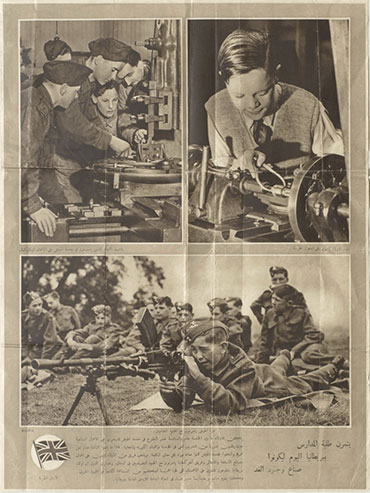|
London, 15/10/2015
MBI Al Jaber Lecture Series: ‘Digitising British Imperialism in the Gulf: The British Library - Qatar Foundation Partnership’ by Louis Allday
 |
| British Government propaganda poster in Arabic from WW2 |
Louis Allday, a Gulf History and Arabic Language Specialist at the British Library and a PhD candidate in the History Department at SOAS, gave the first lecture of the MBI Al Jaber Lecture Series on 15th October, 2015.
Louis discussed the work of the British Library-Qatar Foundation partnership (BLQFP) and the bi-lingual (English/Arabic) online portal that it has created, the Qatar Digital Library (QDL). The QDL was launched in November 2014 and can be found at www.qdl.qa. Since its launch, the QDL site has been used by an average 10-12,000 users per month, primarily in the US, UK and across the Gulf region (in Bahrain, Kuwait, Saudi Arabia, Oman, Qatar and the UAE).
The BLQFP has two main branches: the enhanced cataloguing and digitization of a number of the library’s Arabic-language scientific manuscripts from around the Islamic World, and the enhanced cataloguing and digitization of India Office Record (IOR) materials related to the history of the Persian Gulf and the broader Middle East. It was the latter aspect of the project that Louis introduced in the lecture.
The IOR files contain a wealth of information regarding Britain’s colonial role in the Gulf, notably in the archives of the numerous political agencies and residencies through which Britain administered its informal empire in the region. They also contain earlier records related to the East India Company’s involvement in the Gulf (and broader region) that begun in the 17th Century and which Britain’s later colonial domination grew out of. The private papers of relevant individuals (including Gertrude Bell and Lord Curzon) are also being uploaded on to the QDL site, as well as John Gordon Lorimer’s Gazetteer of the Persian Gulf, Oman and Central Arabia, a well-known, multi-volume intelligence report that was published in secret by the British Government in 1915.
Louis explained the complex series of processes involved in a digitization project of this scale (including conservation, enhanced cataloguing, translation, imaging and quality assurance) and detailed the numerous benefits that enhanced cataloguing brings to researchers whether they are online using the QDL portal or using the British Library’s internal system to physically request files.
Using the example of Yusuf bin Ahmed Kanoo (a prominent Bahraini merchant in the early 20th Century), Louis explained how before the work of the BLQFP, a search for Kanoo’s name on the British Library’s system would have produced zero search results but now, following enhanced catalogue records written by himself and his colleagues, 25 entries are found. In this way, the project aims to increase not only the accessibility of the files (by putting them online) but also improve the discoverability of the varied and historically significant information contained within them. Another example Louis gave was the use of propaganda posters (produced by Britain’s Ministry of Information during WW2) as paper during a paper shortage in Bahrain. These posters, previously hidden and not mentioned in the file’s catalogue description, are now online and fully discoverable in any searches for the keywords ‘propaganda’ or ‘poster’.
Louis also discussed contextual articles written by himself and other BLQFP curators for the QDL site, and provided some examples of how these articles have led to interactions with members of the public who have personal and familial connections to the political history contained in the IOR files. Louis and other members of the team are keen to encourage more interactions of this kind.
You can follow the project on Twitter at @BLQatar.
For further information, please contact:
Director Public Relations
[email protected] |


